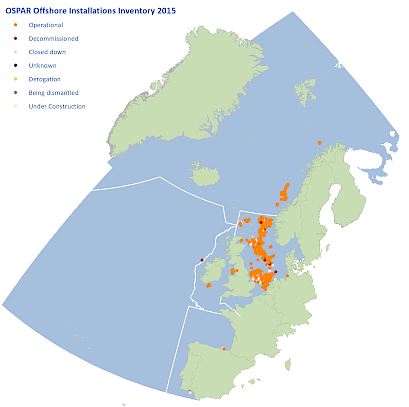Special consultative meeting
OSPAR held a special consultative meeting in accordance with OSPAR Decision 98/3 on the Disposal of Disused Offshore Installations today in London.
On Friday 18 October 2019 a meeting was held in London in accordance with OSPAR Decision 98/3 on the Disposal of Disused Offshore Installations. The Decision prohibits the dumping, and leaving wholly or partly in place, of disused offshore installations within the maritime area but sets out a process for considering derogations to this prohibition.
The meeting discussed the UK’s intention to issue derogation for leaving in-situ the footings of the Brent Alpha Steel Jacket and Brent Bravo, Brent Charlie and Brent Delta gravity based concrete installations structures which contain oil as well as contaminated water and sediment. The operator of the Brent field, 180km north-east of Shetland, stated that it had explored potential reuse options including carbon dioxide storage and wind farms but did not consider these options credible due to the age and distance from shore of the Eiffel Tower-sized platforms. The operator considered there to be minimal environmental and safety legacy risks and recommended that the footings of the Brent Alpha Steel Jacket and Brent Bravo, Brent Charlie and Brent Delta gravity based concrete installations be left in place.
A formal objection to the issuing of the permit for derogation was raised by Germany in April 2019. Ongoing consultations between the UK and Germany clarified the concerns that the German government had made about the comparative assessment methodology used by the operator, as well as the likely long-term risk to the marine environment due to hazardous substances and oil residues left in the cell tank structures, as well as the risk to shipping and fishing, also being a legacy environmental hazard. A special consultative meeting was requested in accordance with Annex 3 of the Decision to further these discussions. At the meeting on 18 October the position of Germany was supported by Belgium, the European Union, the Netherlands and Sweden. OSPAR observers Greenpeace, Seas at Risk and KIMO both stated their support for the removal of the structures and their contents.
The OSPAR Commission, as an intergovernmental organisation composed of 15 governments and the European Union, provides a forum for inter-governmental cooperation on matters related to the protection and conservation of the North-East Atlantic, and is committed to ensuring impartiality when supporting Contracting Parties in the application of the OSPAR Convention. Pollution in the marine environment does not respect international borders and today’s meeting highlights the value of constructive dialogue within the OSPAR framework.
The United Kingdom, in accordance with Decision 98/3, will further engage in discussions with parties before taking a decision on whether to issue the permit for derogation. Germany declared its full support and willingness to further consult both bilaterally and within an OSPAR context in order to seek a viable and agreeable solution to the questions discussed. In view of further upcoming decommissioning projects, this thorough process will offer the opportunity to agree on common OSPAR-standards for comparable challenging decommissioning cases.
ENDS
Note for editors
- The OSPAR Commission was set up by the 1992 OSPAR Convention for the Protection of the Marine Environment of the North-East Atlantic, which unified and updated the 1972 Oslo and 1974 Paris Conventions. It brings together the governments of Belgium, Denmark, Finland, France, Germany, Iceland, Ireland, Luxembourg, the Netherlands, Norway, Portugal, Spain, Sweden, Switzerland and the United Kingdom, together with the European Community. Belgium, Denmark, The European Commission, Finland, Germany, Ireland, The Netherlands, Norway, Sweden and the United Kingdom attended the meeting.
2. More than 30 international non-governmental organisations are involved in OSPAR as official Observers. They represent a broad range of interests and expertise related to the marine environment and the uses of marine resources. Many contribute information, insights and standpoints. This is much appreciated feedback from civil society and the economy. The OSPAR Commission greatly values these partnerships that help inform its decisions and other results. (See list on OSPAR website at http://www.ospar.org/organisation/observers). OSPAR observers Greenpeace, Seas at Risk, KIMO and the International Association of Oil and Gas Producers (IOGP) attended the meeting.
3. Since 1998 the dumping, and leaving wholly or partly in place, of disused offshore installations is prohibited within the OSPAR maritime area under OSPAR Decision 98/3 on the Disposal of Disused Offshore Installations https://www.ospar.org/documents?d=32703. However, following assessment, the competent authority of the relevant Contracting Party may give permission to an operator to leave installations or parts of installations in place in certain cases.
4. In the OSPAR Maritime Area, more than 1350 offshore installations are operational and 170 have been decommissioned https://odims.ospar.org/layers/geonode:ospar_offshore_installations_2015_01_001. Since 2001 and under OSPAR Decision 98/3, 9 derogations have been granted by the United Kingdom and Norway. In all nine cases comments and objections have been received and solved during the consultation process in accordance to Annex 3 of OSPAR Decision 98/3. Therefore, no Special Consultative Meeting has previously been held under paragraph 6 - Annex 3 of OSPAR Decision 98/3.
5. OSPAR Contracting Parties with oil and gas industry offshore installations are: Denmark, Germany, Ireland, the Netherlands, Norway, Spain and the United Kingdom. Offshore Installations in the offshore maritime area are shown below.

